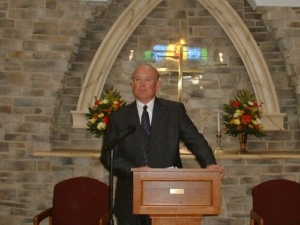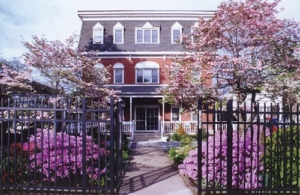Homeland Center recognizes past achievements, focuses on the challenges ahead
In its 147 year history, Homeland Center has never asked a resident to leave because they lacked funds.

“I want to use past successes only as learning experiences … our challenge is the future,” said Barry S. Ramper II
Making good on this practice over the past year, Homeland Center has provided more than $2.8 million in charitable care for residents, auditor David H. Padden reported during the annual meetings of Homeland’s boards of Trustees and Managers held recently. Homeland typically outspends its peer facilities on per resident care by 30 percent as well.
But with the reports came a warning from President and CEO Barry S. Ramper II: In today’s challenging health care environment, the continued generous support of donors is critical to Homeland’s future.
“I want us to use past successes only as learning experiences and not to rest on them,’’ Ramper said. “What happened yesterday will not benefit our residents who have entrusted their lives to us for today and for tomorrow. Our challenge is the future.’’
To assure that Homeland can continue providing benevolent care, a goal to increase its endowment by $20 million by the year 2020 has been set. To realize this goal, Homeland established the 1867 Society to recognize individuals and couples who have made significant, tax-deductible commitments to the endowment. Charitable annuities, trusts, bequests, gifts of life insurance and real estate are among the donations that can support Homeland.
In light of the enthusiastic response to date, the deadline to become a charter member of the society has been extended until Dec. 31. Society members will be recognized annually (with permission) at a special event and in newsletters and have their names prominently displayed. Betty Hungerford, director of development, will be happy to discuss opportunities to support Homeland. She can be reached at 717-221-7727.
“Growing our endowment and planning for the future ensures we can continue to fulfill our responsibilities to our residents and the community,’’ Ramper said. “This is our heritage. This has been our responsibility going back to 1867.’’
Ramper said skilled nursing and personal care is the second-highest regulated industry – homeland security being first and the nuclear power industry third. The combination of regulations and limited federal funding underscores the importance that donations play in Homeland’s continued success.

To assure Homeland can continue providing benevolent care, a goal to increase its endowment by $20 million by the year 2020 has been set.
Homeland’s devotion to resident care makes it one of the few Medicare designed five-star facilities in the Harrisburg area. Moreover, the center was named for a third year in a row as Harrisburg Magazine’s Readers’ Choice for Best Long-Term Care Facility.
Ramper and Trustees Chairman Morton Spector referred to the success of Homeland Hospice as an example of the innovation and adaptability of which Homeland is proud. Homeland Hospice is one of the leading hospice providers in central Pennsylvania.
“Five years ago we established Homeland Hospice, the first of our outreach efforts to provide palliative care in settings including at home, in our facility or in another nursing home or hospital,’’ Spector said. “We continue to address unmet medical and social needs, guaranteeing the high quality of care that has been our hallmark over the past 147 years.’’
Among the improvements in the past year, Homeland Center completed a facility-wide wireless system, giving residents, employees and guests Internet access through a high-performing network. The system upgrades are making it possible for Homeland to implement an Electronics Health Records system to improve care and a medication management system to ensure resident safety.
Additionally, Homeland has added three beds to the center’s Ellenberger Unit, which will enable the center to care for 24 residents with advanced memory impairment, Alzheimer’s disease or another form of dementia.
Homeland’s mission has changed since it was founded to shelter the area’s women and children whose husbands and fathers had died in the Civil War. However, Ramper stressed the focus on quality care – made possible largely by the generous support of our community — has never changed.
“It’s not about policy, it’s not about procedures, it’s not about regulations and it’s not about audits,’’ Ramper said. “The residents entrust their lives to us and in turn we owe them our full commitment.’’


